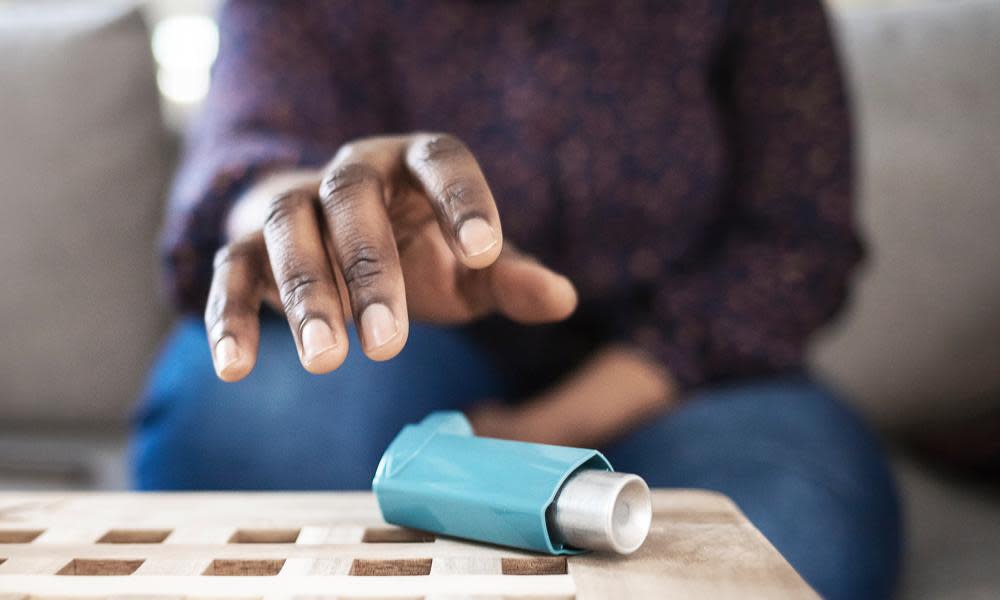Asthma attacks in more than 1m people linked to UK cost of living rationing

More than a million people in the UK have experienced life-threatening asthma attacks after cutting back on medicine, heating or food amid the soaring cost of living crisis, a survey suggests.
One in five (20%) people living with asthma in the UK – of which there are 5.4 million – have had an attack as a result of changes they have been forced to make due to rising energy, food and household bills, according to the research by Asthma + Lung UK. Fuel poverty campaigners described the figures as “distressing”.
Almost half of the 3,600 people with lung conditions such as asthma, chronic obstructive pulmonary disease (COPD) and bronchiectasis surveyed by the charity said their health had worsened since the crisis began.
Asthma + Lung UK warned there could be a “tidal wave” of hospital admissions in the next few months as cold weather, an abundance of viruses and people cutting back on medicines, heating, food and electricity put them at increased risk.
Sarah Woolnough, the charity’s chief executive, said: “Untenable cost of living hikes are forcing people with lung conditions to make impossible choices about their health.
“Warm homes, regular medicine and a healthy diet are all important pillars to good lung condition management – but they all come at a cost. We are hearing from people already reporting a sharp decline in their lung health, including many having life-threatening asthma attacks.
“With temperatures beginning to fall and further energy price hikes looming, we’re seriously worried that when winter bites it will tip the country into a public health crisis.”
The charity is calling for tailored financial support to help meet the increasing price of food and prescriptions, costing some people with asthma more than £400 a year.
“Lives are at risk if the government doesn’t step in to help people with lung conditions, including ending unfair prescription charges and providing financial support for people who face extra energy bills for medical equipment,” Woolnough added.
The survey found 90% of people with lung conditions had already made significant changes to cope with the rising cost of living, such as 63% eating less and buying less food, 15% cutting back on their inhaler to make it last longer, 5% borrowing medicines from someone else and 6% not collecting their prescriptions.
Almost half (49%) said their lung condition had become worse because of changes they had made, 20% reported an asthma attack or exacerbation and 19% had to see their GP.
Other health charities also issued fresh warnings about the cost of living crisis.
A survey by the MS Society found one in five people with multiple sclerosis in the UK (19.6%) did not have enough money to start medication or treatments they needed.
And a third (33.9%) have had to reduce or stop treatments or therapies, risking their symptoms worsening, the opt-in survey of 1,108 people with MS, suggests. It also found 40% of respondents were having to borrow money to make ends meet.
Simon Francis, a co-ordinator of the End Fuel Poverty Coalition, said the Asthma + Lung UK figures “paint a distressing picture”.
“As energy bills go up on 1 October, millions of people will find themselves in increasingly cold and damp homes, which will make pre-existing health conditions worse. The government may have missed the chance to help people in the recent budget, but there is still a small window of opportunity to get urgent financial help to people who need it the most.”
Macmillan Cancer Support also warned patients were facing an “impossible choice” between getting to hospital appointments or buying food as it revealed record numbers were already turning to the charity for financial help this year.
New figures from Macmillan suggest an estimated 2 million people with cancer in the UK (66%) are already concerned about the cost of food or water bills over the next 12 months. Cost pressures had led to at least 20,000 cancer patients (6%) delaying or cancelling travel to medical appointments, it said.
Lynda Thomas, the charity’s chief executive, said: “Not only are many struggling with the ongoing delays to cancer treatment and benefit payments, they are now burdened with the rising cost of living with concerns that this winter, the worst is yet to come.”

 Yahoo Movies
Yahoo Movies 
